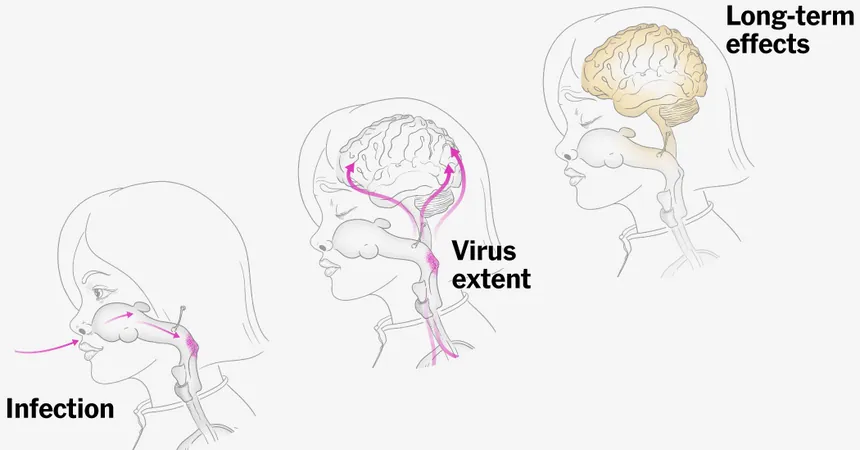
The Hidden Dangers of Measles: Understanding How It Affects Unvaccinated Children
2025-04-06
Author: Rajesh
The Hidden Dangers of Measles: Understanding How It Affects Unvaccinated Children
Measles, one of the most contagious viruses known to man, poses a grave threat to unvaccinated children. With a staggering 90% infection rate for those exposed, the virus can invade even the most seemingly ordinary places—classrooms, school buses, or grocery stores—becoming a potential death sentence for vulnerable children.
With the rising decline in vaccination rates across the United States, we are witnessing outbreaks that have already resulted in over 580 cases and at least two fatalities. Health experts warn that if this trend continues, measles may soon affect hundreds, if not thousands, more children across the nation.
How Measles Invades the Body
Unlike many viruses that spread through direct contact, measles can linger in the air for up to two hours after an infected person leaves a space. An unvaccinated child can inhale virus-laden droplets from a previously occupied area, initiating a dangerous pathway. The virus infiltrates the body through the lining of the nose or mouth, or even by touching the eyes.
Within 24 hours, the virus commandeers cells in the nasopharynx, spreading further into the lungs. It multiplies, creating a viral army ready to attack. As the days pass, the virus infiltrates lymphoid tissues and travels to various organs. Unlike a vaccinated child, who would have the immune system swiftly jumping to action, the unvaccinated child feels no immediate symptoms during this critical incubation period that lasts between one and three weeks.
However, as the viral load escalates, the child eventually starts showing signs of illness. The sequence of symptoms generally begins with malaise and fever, followed by redness and irritation of the eyes, coughing, and nasal congestion. In some cases, children develop small, grayish spots inside the cheeks, though they often go unnoticed.
The defining feature of measles is the distinctive red rash that appears, typically starting on the face and spreading to other body parts. While many symptoms resolve on their own over time, complications can arise if a fever persists beyond a few days.
Complications and Dangers of Measles
As the rash fades, the infection can rapidly escalate, particularly affecting the lungs and other vital organs. Dr. Summer Davies from Covenant Children’s Hospital in Lubbock, Texas, has witnessed many shocking cases where healthy children suddenly deteriorate into severe illness.
A high fever of 104-105 degrees can accompany the infection, leading to dehydration, sore throat, and diarrhea, complicating the condition further. Infants and young children are especially susceptible due to their smaller airways and their inability to articulate symptoms effectively. Alarmingly, one in 20 children with measles will develop pneumonia, which can be life-threatening.
In one tragic case, a 6-year-old girl died due to pneumonia stemming from measles. Her parents described how she seemed fine one moment, only to decline rapidly, succumbing to the illness despite medical intervention.
In addition to respiratory complications, measles is notorious for causing “immune amnesia,” leaving children vulnerable to other infections for months or even years. Around one in 1,000 children may develop encephalitis, resulting in severe outcomes that can result in permanent damage to brain tissue.
For immunocompromised children, the risk intensifies with conditions like measles inclusion body encephalitis (MIBE) and subacute sclerosing panencephalitis (SSPE), both of which carry significant mortality rates and can lead to tragic consequences long after the initial infection clears.
The heart-wrenching story of Erica Finkelstein-Parker serves as a devastating reminder of these hidden dangers. Her daughter, Emmalee, displayed unusual behavior years after a past measles infection went undetected. Unfortunately, by the time the family sought answers, it was too late, and Emmalee succumbed to complications related to SSPE just months later.
With these unsettling realities, the decision to vaccinate cannot be overstated. Protecting your child not only safeguards their health but also prevents the potential danger to countless others in the community. The prevention of measles is a public health imperative we all share. Don't let your child become a statistic—vaccinate!


 Brasil (PT)
Brasil (PT)
 Canada (EN)
Canada (EN)
 Chile (ES)
Chile (ES)
 Česko (CS)
Česko (CS)
 대한민국 (KO)
대한민국 (KO)
 España (ES)
España (ES)
 France (FR)
France (FR)
 Hong Kong (EN)
Hong Kong (EN)
 Italia (IT)
Italia (IT)
 日本 (JA)
日本 (JA)
 Magyarország (HU)
Magyarország (HU)
 Norge (NO)
Norge (NO)
 Polska (PL)
Polska (PL)
 Schweiz (DE)
Schweiz (DE)
 Singapore (EN)
Singapore (EN)
 Sverige (SV)
Sverige (SV)
 Suomi (FI)
Suomi (FI)
 Türkiye (TR)
Türkiye (TR)
 الإمارات العربية المتحدة (AR)
الإمارات العربية المتحدة (AR)